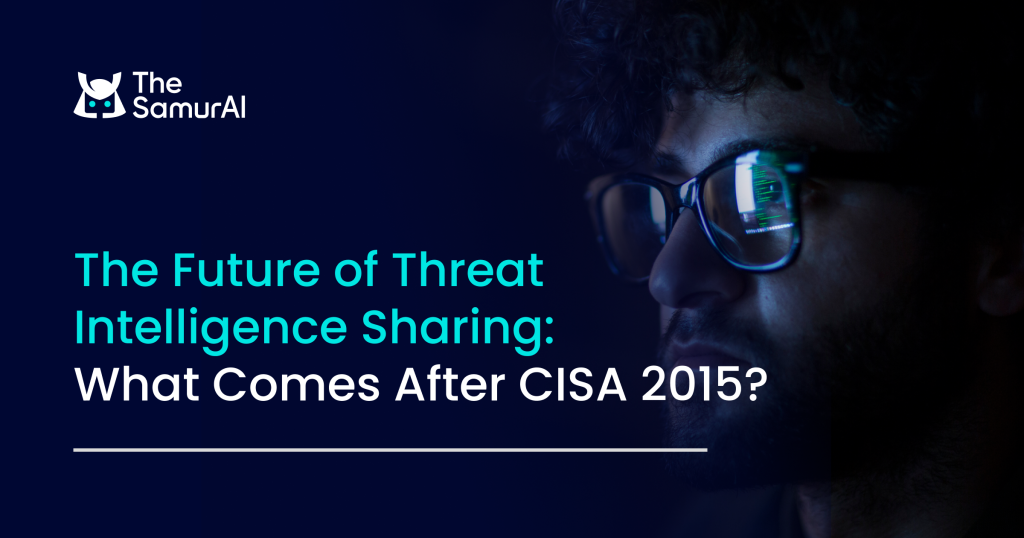When it comes to cybersecurity, cooperation between the public and private sectors isn’t just helpful—it’s essential. The ongoing debate in Congress over the CISA 2015 renewal has left many wondering how the U.S. will maintain strong cyber threat intelligence sharing.
Will Congress revive or replace CISA 2015—and what does that mean for public-private threat intelligence sharing?
Without a clear replacement or update, the flow of vital threat data between businesses and government agencies could weaken collective cyber defenses. Let’s unpack why this is important and how The SamurAI helps organizations stay protected in the meantime.
What Was CISA 2015 and Why It Mattered
Cybersecurity Information Sharing Act (CISA 2015) creates a bridge of communication between companies and government agencies to share information about cyber threats and its defensive measures real time. It offers liability protection and privacy safeguards that help the federal government act quicker on cyber threats.
Key benefits included:
- Liability protections for companies that shared verified cyber threat indicators
- Privacy safeguards requiring personal data removal
- Automated intelligence sharing systems through the Department of Homeland Security
In short, CISA 2015 helped create trust between the public and private sectors—a foundation for stronger collective cyber defense.
What Happens Now That CISA 2015 Has Expired
CISA 2015 has officially expired last September 30, 2025. Without renewal, uncertainty has set in across the cybersecurity community.
Here’s what that means:
- Many organizations may hesitate to share threat data, fearing legal exposure.
- The Automated Indicator Sharing (AIS) platform could slow down or be suspended.
- Some states or industries might start building their own sharing systems, fragmenting cooperation.
- Trust between private companies and government agencies could weaken—just when we need it most.
The longer Congress delays renewal or replacement, the more likely it is that cyber defenses become slower to respond.
Why Cyber Threat Intelligence Sharing Still Matters
Various cyber threats like ransomware, supply chain attacks, and AI-driven phishing evolve on daily basis. Without open information exchange, detection slows, and response time are delayed. Imagine fighting fires but refusing to tell your neighbors how the fire started, it’s that serious.
Shared intelligence helps:
- Identify attacks early
- Prevent lateral movement between organizations
- Strengthen nationwide cyber resilience
That’s why the expiration of CISA 2015 is more than a legal issue, it’s a national security concern.

How The SamurAI Helps Organizations Adapt
The longer policymakers delay strategies to mitigate these emerging cyber threats; businesses are at risk. With the help of SamurAI it provides trust between private-sector intelligence sharing and cybersecurity solutions that fill the gap.
1. Threat Intelligence as a Service (TIaaS)
Get access to curated, actionable threat data without the risk. The SamurAI connects trusted partners, filters false positives, and ensures your organization stays ahead of emerging attacks.
2. Data Privacy and Legal Compliance
With CISA 2015 gone, organizations must protect themselves. The SamurAI helps design data anonymization and regulatory-compliant sharing pipelines, so you can collaborate safely and legally.
3. Secure Private Sharing Networks
The SamurAI builds controlled, encrypted environments for intelligence exchange—giving you the benefits of collaboration without exposure.
4. AI-Driven Threat Correlation and Analysis
Our AI-powered platform enriches raw indicators, detects trends, and connects the dots faster than ever—so you’re not just informed, you’re prepared.
5. Strategic Cyber Threats Advisory
The SamurAI keeps clients updated on pending legislation, compliance changes, and new threat trends—helping you adapt policy, training, and defenses in real time.
What Policymakers Should Do to Support Cyber Threat Intelligence Sharing
To rebuild confidence and strengthen cyber defense, Congress should:
- Reauthorize or modernize CISA 2015
- Update legal protections for AI-based threat sharing
- Maintain strong privacy and accountability measures
- Support faster, automated sharing platforms
But even if progress is slow, your business doesn’t have to stand still.

The expiration of CISA 2015 marks a critical turning point in the cybersecurity landscape. While policymakers debate the future of public-private threat intelligence sharing, cyber threats aren’t waiting—and neither should your organization. Now more than ever, proactive, secure, and intelligent collaboration is key to staying ahead of evolving risks.
Don’t let legislative uncertainty put your business at risk. Schedule a consultation with The SamurAI today and discover how your organization can build resilient, compliant, and future-ready cyber defenses—no matter what comes next. Stay ahead with The SamurAI.
